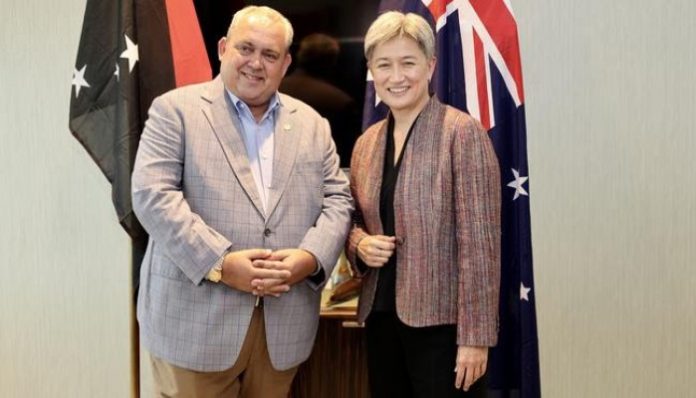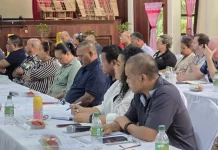Papua New Guinea’s new Foreign Minister Justin Tkatchenko has revealed his country is moving to negotiate a security treaty with Australia — and potentially New Zealand — in a move that could have far-reaching strategic implications for the region.
While Australia and Papua New Guinea have strong security links, the two countries have never signed a formal treaty.
The fact it is being contemplated seems to signal that both Canberra and Port Moresby are willing to build a deeper defence relationship as China entrenches its power in the region.
Tkatchenko told the ABC he discussed the idea with Foreign Minister Penny Wong during her visit to Port Moresby this week, and both countries were keen to press ahead with negotiations.
“There were discussions of a treaty going forward between our countries to ensure we are all on the same page when it comes to security in the region,” he said.
“And it will also make us connected in all aspects of anything that might arise now or into the future.”
Tkatchenko said the treaty “would cover all security aspects in the region” and could well take in New Zealand as well – although he did not say whether he had had any discussions with the Kiwis on the subject.
“I would say New Zealand would be a major part of it as well, in our region. It would be a joint treaty to work on security,” he told the ABC.
“A treaty between our traditional partners in the region will just help give security to all countries.”
Tkatchenko did not say whether the treaty could be binding, or whether it would be a broader informal agreement, stressing that discussions were at a very early stage.
“[This] has yet to be confirmed and finalised, it still has to go through the appropriate procedures and departments like Defence, like the Prime Ministers’ [department] and others to come to a complete understanding of that arrangement,” he said.
“It’s all not in black and white yet. But it was put on the table and it’s something that will be considered and taken forward into the future.”
He said both countries would have more detailed discussions about the proposal at the PNG-Australia Ministerial Forum due to be held in Canberra in November.
Tkatchenko’s announcement comes as Australia pours more resources into its military ties with Papua New Guinea.
The federal government is already pressing ahead with a $175 million (US$119 million) upgrade of the Lombrum Naval Base on PNG’s Manus Island with the United States.
Defence Minister Richard Marles said he wants to rapidly expand defence ties with Papua New Guinea, suggesting that the expanded Lombrum base would be a key asset for military forces in both countries.
In addition, Australia recently signed an agreement to help rebuild the Papua New Guinea Defence Force air wing.
The ABC asked Senator Wong about the proposed treaty during an interview on Tuesday afternoon in Port Moresby.
She played down the prospect of any security treaty being struck soon, saying she had only had “very, very early discussions” with Tkatchenko and didn’t want to get “ahead” of talks with the newly elected government under James Marape.
“We obviously … discussed some of the items contemplated under [our partnership], which include discussions about security, but we have a long way to go. It’s a new government, and we want a list of what Papua New Guinea’s priorities are,” she told the ABC.
She also would not be drawn on whether New Zealand might also be invited to join, or what shape the treaty might take.
“Those are matters that will be discussed by Australia and Papua New Guinea. But you wouldn’t be surprised at both countries wanting to continue to work together on security cooperation, we have a long standing defence relationship,” she said.
Still, Dr Anna Powles from Massy University said Tkatchenko’s declaration about the treaty was “a surprising development,” particularly given Papua New Guinea’s new government had only just taken shape after national elections.
She suggested the move might have been triggered by increasing anxiety in Port Moresby about the implications of the security agreement that China struck with Solomon Islands, saying it “likely reflects Prime Minister Marape’s concerns about the Solomon Islands-China security deal on his doorstep”.
“Australia has sought to establish a hubs and spokes system of bilateral security treaties in the Pacific, and a security treaty of this nature with PNG would be an obvious extension of that,” she told the ABC.
But the prospect of Australia, New Zealand and PNG all signing a new military agreement is likely to have strategic reverberations across the region.
Dr Powles said while a number of Pacific countries already had strong defence ties with Australia, many would still monitor negotiations between Canberra and Port Moresby very carefully.
“It is timely that Pacific countries consider what their red line is on security, however, it is unclear what this proposed treaty entails or how it fits into both the existing architecture or the review of the regional architecture called for in the 2050 Strategy for the Blue Pacific,” she said.
China is also likely to be hostile to the proposed treaty, although Tkatchenko brushed off suggestions that a new defence agreement might stir anger in Beijing, or in PNG’s neighbour Solomon Islands.
“That’s our sovereign right to work with treaties with anybody that we feel is appropriate and we feel is right and for the good of the country,” he told the ABC.
“For us, the last thing we want to do is cause problems and issues between our friends.
“China is a strong economic partner and friend to Papua New Guinea and we will continue with that relationship.”
If New Zealand also signs the treaty it would be the first time it has inked a joint security agreement with Australia and a Pacific Island country, although Dr Powles suggested Wellington would likely approach the subject carefully.
“NZ’s line on regional security is that efforts should align and support the regional architecture and existing security arrangements, including the Biketawa Declaration,” she said.
“It’s unclear whether this treaty would complement, align or stands alongside the existing regional security arrangements,” she said.
SOURCE: ABC/PACNEWS














[…] New Guinea (PNG) has announced it wants to establish a security agreement with Australia, welcome news for analysts wary of rising […]
[…] New Guinea (PNG) has announced it wants to establish a security agreement with Australia, welcome news for analysts wary of rising […]
[…] New Guinea (PNG) has announced it wants to establish a security agreement with Australia, welcome news for analysts wary of rising […]
[…] New Guinea (PNG) has announced it wants to establish a security agreement with Australia, welcome news for analysts wary of […]